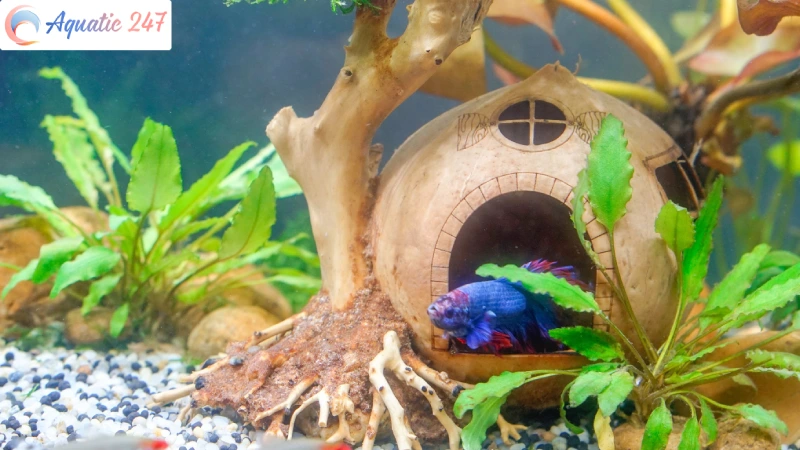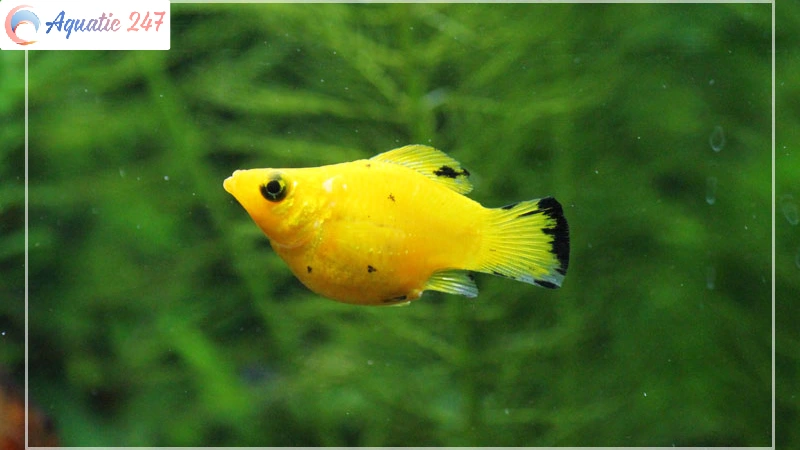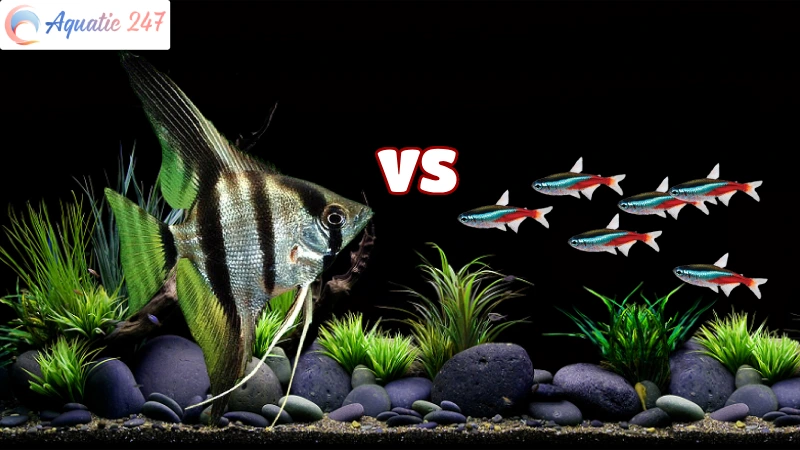Betta fish hiding can be alarmingly warming for healthy fish. This unusual behavior is caused by many different reasons. In this post, Aquatic 247 will provide reasons why is my Betta fish hiding and what we should do to stop that behavior.
Do Betta fish like to hide?
The answer is yes. Betta fish have an instinct for self-preservation.
In the wild, they seek out hiding places to avoid predators. This conduct is profoundly embedded in their DNA and persists even in captivity. So, when threatened or stressed, Bettas may seek refuge in a quiet spot for protection.

Why is my Betta fish hiding?
Why is my Betta hiding? The issues can be readily handled by removing the cause of stress. Here are some of the main reasons:
Limited hiding spaces
Betta doesn’t swim in large spaces since this is an instinctive behavior that it has developed from nature. If fish are raised in an aquarium with huge spaces but limited hiding spaces, they seek shelter under any decorations.
Bad water quality
Betta fish often hide due to poor water quality. Hazardous chemicals are formed from fish excrement and decaying food. When these levels rise, they can harm your Betta’s health, making them feel uncomfortable and unhappy.
Water quality can rapidly fluctuate and become hazardous to your fish. As a result, it is critical to use a liquid testing kit to monitor the levels in the water.
- Nitrates: under 15ppm
- Ammonia: 0 part-per-million ppm
- Nitrite: 0 ppm
- pH: 6.5 – 7.5
- Temperature: 78–80°F (25–27°C)
Loud noises
Loud noises can make your fish feel anxious and terrified. If the noise occurs repeatedly, the fish will most likely refuse to leave their hiding area.
The lights are too bright
Bettas are not accustomed to light in their natural habitat. Instead, these tropical fish reside in water bodies with plenty of plants and shade. It enjoys dimmer surroundings, so add extra plants to provide shade.
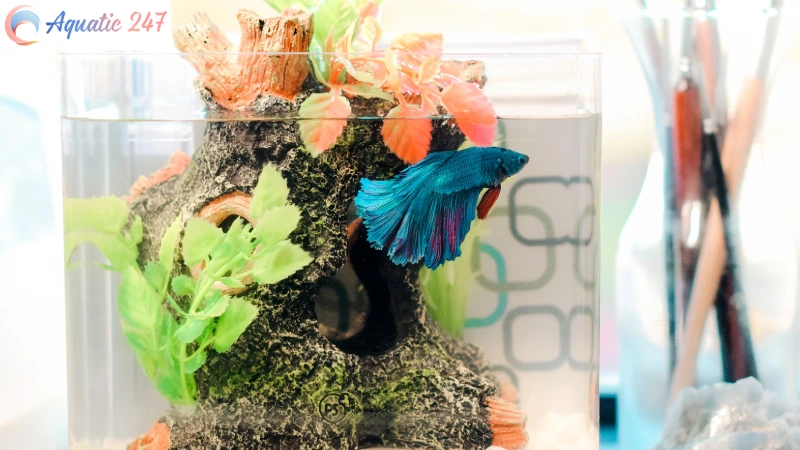
Aggressive tank mate
A territorial tankmate may force your Betta to seek refuge. This is a behavior used to escape detection by teammates and prevent conflict or chase.
Bullying is a common reason that Bettas hide in communal tanks. Always ensure that the fish are compatible with one another and do not harass the Betta.
Sickness
Betta hiding can be an indication of injury or disease. Any physical symptom should be taken seriously. Look for evidence of injuries, such as torn fins or odd areas on the body.
Changes in swimming style, loss of appetite, or discoloration may potentially indicate underlying health issues. Proactively monitoring your Betta’s health enables you to treat any issues as soon as they arise.
What is the fix for Betta fish hiding behavior?
First, you should identify the reason why your Betta is hiding. Then, you have a plan suitable for fish. Here are some methods that you can reference.
Large hiring spaces
Betta feels comfortable in the aquarium, which has many trees and decorations. This provides a lot of space for refuge. After all, their natural environment is rich in plants.
Good water quality
Bettas are very susceptible to ammonia and nitrites, therefore, use a trustworthy test kit to check water parameters regularly. If you see any increases in these levels, you must take urgent action.
- Partial water changes
- The addition of beneficial bacteria
- The use of a water conditioner developed specifically
Quiet environment
You should keep the tank in a quiet location, preferably away from the TV and crowded areas of the house.
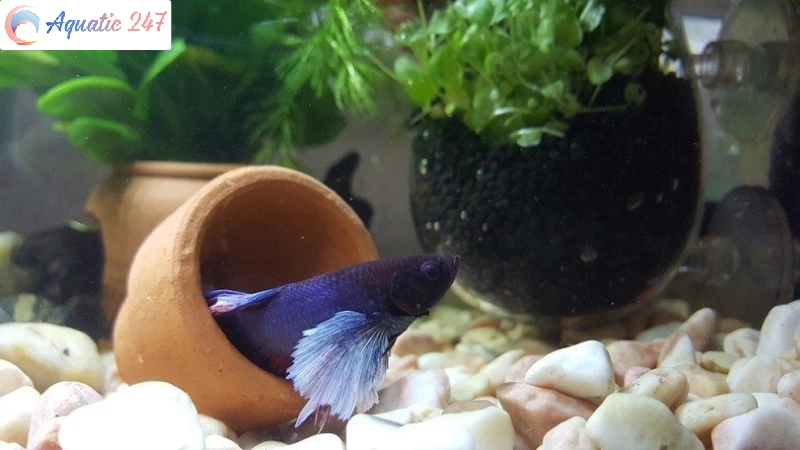
Faint light
Adjusting the lights in the aquarium is critical for creating a comfortable habitat for the Betta fish. Reduce the intensity of the light to help your Betta fish cope with tension and anxiety.
These shaded spaces provide a protected refuge where your Betta can relax without feeling continuously interrupted.
Peaceful tank mates
Introducing calm tank mates is essential for building a pleasant atmosphere for your Betta fish. Choose fish species with calm societies, such as neon tetras, corydoras catfish, or mollies, to be non-aggressive for Betta.
Health care
Checking health is often extremely important for the early detection of every problem. Observing behavior might help you detect any changes that may suggest a concern.
For example, if you fear an injury from the filter’s sharp edges, consider padding them with foam to prevent further damage. Creating a comfortable environment in which your baby feels protected is critical to his recuperation.
At the same time, we looking for advice from a veterinarian who specializes in aquatic animals and also has an understanding of have value of taking care of Betta fish.
In conclusion
Through this post, Aquatic 247 hopes you answer the question: Why is my Betta fish hiding? So, creating a pleasant and stress-free environment for your Betta requires maintaining appropriate water conditions, offering ample hiding locations, and dealing with aggressive tankmates. Monitoring your Betta’s behavior and responding quickly to any signs of illness or damage is critical for their health.

